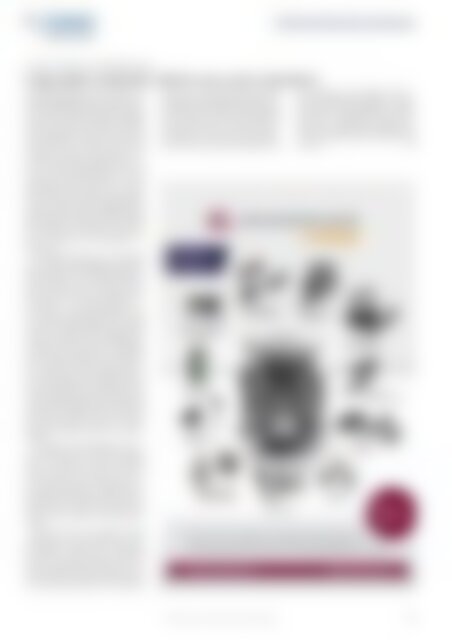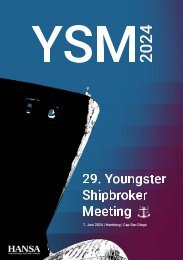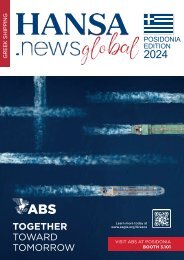HANSA 06-2019
Reparatur & Umbau | Start-Ups | COMPIT Review | CIMAC 2019 | Terminaltechnik | Batterien & Hybrid | Offshore-Flotte | U.A.E. | Cruise Ship Interiors | Zeaborn & Offen
Reparatur & Umbau | Start-Ups | COMPIT Review | CIMAC 2019 | Terminaltechnik | Batterien & Hybrid | Offshore-Flotte | U.A.E. | Cruise Ship Interiors | Zeaborn & Offen
Erfolgreiche ePaper selbst erstellen
Machen Sie aus Ihren PDF Publikationen ein blätterbares Flipbook mit unserer einzigartigen Google optimierten e-Paper Software.
Schiffstechnik | Ship Technology<br />
CIMAC WORLD CONGRESS <strong>2019</strong><br />
Large engine community calls for cross-sector cooperation<br />
The IMO decision of April 2018, calling<br />
the shipping industry to decarbonise<br />
and at least halve its greenhouse gas<br />
emissions by 2050 marked a paradigm<br />
shift. Until 2023, the IMO will work<br />
out the legislative steps to pave the way<br />
for the industry to achieve its goal and<br />
enable it to invest in new, low- or zero-carbon<br />
power and propulsion systems.<br />
»If these challenges are met, we<br />
will most probably be able to reduce<br />
greenhouse gas emissions by more<br />
than 50% by 2050. If new technologies<br />
can be developed and brought onto the<br />
market in time, there is a good chance<br />
that market mechanisms will enable<br />
the fulfilment of the IMO targets. In<br />
any case, failure is not an option,« CI-<br />
MAC says.<br />
The engine makers see no »silver bullet«<br />
to meet the challenge of the IMO<br />
targets. There are some promising technical<br />
solutions, such as battery driven<br />
ships or fuel cells, but as of today, these<br />
are unable to cover the propulsion of –<br />
for instance – sea-going container vessels.<br />
Technologies such as LNG are seen<br />
as necessary and helpful, but should<br />
only be considered as bridging technologies,<br />
if fossil-fuel based. Hydrogen<br />
and carbon-neutral (bio or synthetic)<br />
fuels could be considered a solution but<br />
are currently far from being competitive.<br />
Other ideas may include innovative<br />
ship design (more efficient hulls,<br />
system integration and optimization) as<br />
well as broader digitalization (including<br />
optimization of port calls and the supply<br />
chain). CIMAC calls for a technology<br />
neutral legal framework on a global<br />
level.<br />
To support the development of technical<br />
solutions in the medium and longterm,<br />
an efficient cross sector R&D<br />
framework must be defined. There is<br />
also a need for other short-term measures<br />
that need to focus on efficiency improvements<br />
and take account of existing<br />
and close to market-ready solutions,<br />
such as LNG retrofits or system optimization.<br />
Quick fixes such as mandatory speed<br />
reductions do not incentivize technical<br />
progress, CIMAC says. They must<br />
be part of a larger toolbox, focused on<br />
the least efficient ships, and be part of a<br />
range of solutions. Power limitation may<br />
be a much more efficient way to address<br />
this issue. De-rating the engine offers the<br />
possibility of lowering the vessel’s maximum<br />
speed and thereby optimizing the<br />
actual load point with the design load<br />
point. Such a measure, based on a power<br />
limitation on the vessel, would inherently<br />
provide a speed advantage for the<br />
visit us at<br />
cimac <strong>2019</strong><br />
JUNE 10-14, <strong>2019</strong><br />
vancouver<br />
digital controls<br />
and softWare<br />
mechanical<br />
governors<br />
comBustion /<br />
ignition<br />
ExHAUst AFtERtreatment<br />
and<br />
turBochargers<br />
With a full range of innovative products,<br />
We are meeting your future requirements today<br />
WWW.WoodWard.com<br />
air / exhaust<br />
floW control<br />
spare parts<br />
best performer / best design. The necessary<br />
developments require co-operation<br />
between all stakeholders, namely<br />
ship owners, shipbuilders, engine manufacturers,<br />
equipment manufacturers,<br />
system integrators and the classification<br />
societies.<br />
n<br />
COMMON-RAIL<br />
systems<br />
lp gas<br />
systems<br />
HFO COMMONrail<br />
systems<br />
pump line<br />
noZZle systems<br />
DUAL-FUEL<br />
systems<br />
WWW.lorange.com<br />
more<br />
efficiency,<br />
loWer<br />
emissions<br />
<strong>HANSA</strong> International Maritime Journal <strong>06</strong> | <strong>2019</strong><br />
55


















